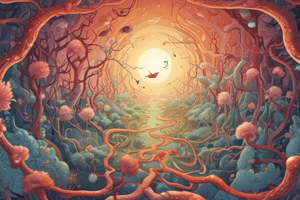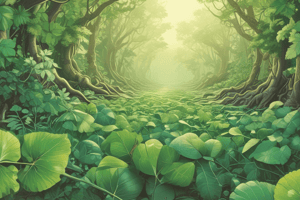Podcast
Questions and Answers
What is the primary focus of biology?
What is the primary focus of biology?
- Study of the evolution of species
- Study of the environment
- Scientific study of life and living organisms (correct)
- Study of non-living organisms
Which branch of biology deals with the study of microorganisms?
Which branch of biology deals with the study of microorganisms?
- Botany
- Zoology
- Microbiology (correct)
- Ecology
What is the function of carbohydrates in living organisms?
What is the function of carbohydrates in living organisms?
- Perform various functions
- Provide energy and structure (correct)
- Regulate body temperature
- Store genetic information
What is the study of the structure and function of cells called?
What is the study of the structure and function of cells called?
What is the role of nucleic acids in living organisms?
What is the role of nucleic acids in living organisms?
What is the primary function of the cell membrane?
What is the primary function of the cell membrane?
Which process involves the production of energy from glucose?
Which process involves the production of energy from glucose?
What is the term for the passing of traits from one generation to the next?
What is the term for the passing of traits from one generation to the next?
What is the process by which individuals with favorable traits are more likely to survive and reproduce?
What is the process by which individuals with favorable traits are more likely to survive and reproduce?
What is the term for the community of living and non-living components in an ecosystem?
What is the term for the community of living and non-living components in an ecosystem?
What is the term for the transfer of energy from one trophic level to another?
What is the term for the transfer of energy from one trophic level to another?
Flashcards are hidden until you start studying
Study Notes
Definition and Scope
- Biology is the scientific study of life and living organisms
- It encompasses various aspects of life, including structure, function, growth, evolution, distribution, and taxonomy of all living organisms
Branches of Biology
- Botany: study of plants
- Zoology: study of animals
- Microbiology: study of microorganisms
- Ecology: study of interactions between organisms and their environment
- Evolutionary biology: study of the evolution of species
- Molecular biology: study of the structure and function of biological molecules
- Cellular biology: study of the structure and function of cells
Biological Molecules
- Carbohydrates: provide energy and structure (e.g. sugars, starches)
- Proteins: perform various functions (e.g. enzymes, hormones, structural proteins)
- Nucleic acids: store genetic information (e.g. DNA, RNA)
- Lipids: provide energy and structure (e.g. fats, oils)
Cell Structure and Function
- Cell membrane: regulates movement of substances in and out of the cell
- Cytoplasm: site of metabolic reactions
- Nucleus: contains genetic material
- Mitochondria: site of cellular respiration
- Endoplasmic reticulum: involved in protein synthesis and transport
Cellular Processes
- Photosynthesis: process by which plants produce energy from sunlight
- Cellular respiration: process by which cells generate energy from glucose
- Mitosis: process of cell division
- Meiosis: process of gamete formation
Genetics
- Heredity: passing of traits from one generation to the next
- Genes: units of heredity that carry information
- Alleles: different forms of a gene
- Dominant and recessive traits: expression of genes
Evolution
- Theory of evolution: explains how species change over time
- Natural selection: process by which individuals with favorable traits are more likely to survive and reproduce
- Speciation: formation of new species
Ecosystems and Ecology
- Ecosystem: community of living and non-living components
- Biotic factors: living components (e.g. plants, animals, microorganisms)
- Abiotic factors: non-living components (e.g. temperature, light, water)
- Energy flow: transfer of energy from one trophic level to another
- Nutrient cycling: cycling of nutrients through the ecosystem
Definition and Scope
- Biology is the scientific study of life and living organisms, encompassing structure, function, growth, evolution, distribution, and taxonomy of all living organisms.
Branches of Biology
- Botany studies plants and their interactions.
- Zoology focuses on animals and their biology.
- Microbiology explores microorganisms and their roles.
- Ecology examines interactions between organisms and their environment.
- Evolutionary biology delves into the evolution of species.
- Molecular biology investigates the structure and function of biological molecules.
- Cellular biology examines the structure and function of cells.
Biological Molecules
- Carbohydrates provide energy and structure to cells, exemplified by sugars and starches.
- Proteins perform various functions, such as enzymes, hormones, and structural proteins.
- Nucleic acids (DNA and RNA) store genetic information.
- Lipids provide energy and structure, exemplified by fats and oils.
Cell Structure and Function
- The cell membrane regulates movement of substances in and out of the cell.
- Cytoplasm is the site of metabolic reactions.
- The nucleus contains genetic material.
- Mitochondria are the site of cellular respiration.
- Endoplasmic reticulum is involved in protein synthesis and transport.
Cellular Processes
- Photosynthesis is the process by which plants produce energy from sunlight.
- Cellular respiration generates energy from glucose.
- Mitosis is the process of cell division.
- Meiosis is the process of gamete formation.
Genetics
- Heredity refers to the passing of traits from one generation to the next.
- Genes are units of heredity that carry information.
- Alleles are different forms of a gene.
- Dominant and recessive traits determine the expression of genes.
Evolution
- The theory of evolution explains how species change over time.
- Natural selection is the process by which individuals with favorable traits are more likely to survive and reproduce.
- Speciation is the formation of new species.
Ecosystems and Ecology
- An ecosystem consists of a community of living and non-living components.
- Biotic factors are living components (e.g. plants, animals, microorganisms).
- Abiotic factors are non-living components (e.g. temperature, light, water).
- Energy flow occurs through the transfer of energy from one trophic level to another.
- Nutrient cycling involves the cycling of nutrients through the ecosystem.
Studying That Suits You
Use AI to generate personalized quizzes and flashcards to suit your learning preferences.




